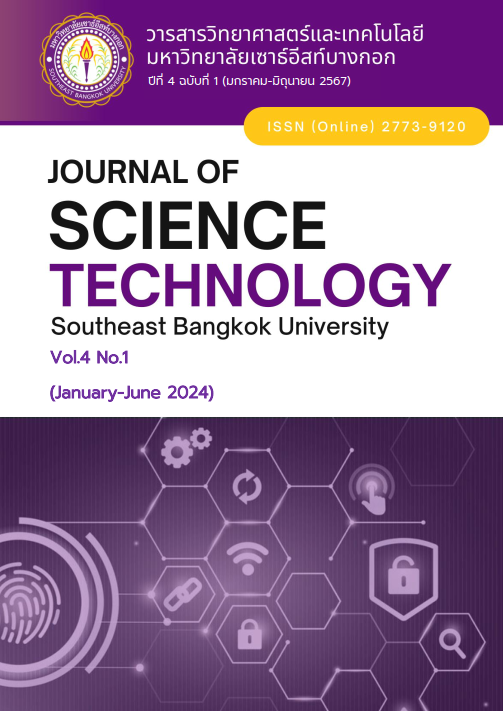HARNESSING ICT TO ENHANCE COMMUNITY COMMUNICATION RESILIENCE: A CASE STUDY OF AN UNDERPRIVILEGED COMMUNITY AND A HOUSING ESTATE COMMUNITY, BANGKOK บทความวิจัย
Main Article Content
บทคัดย่อ
As the need for seamless connectivity becomes paramount, ICT emerges as the catalyst for bridging distances and connecting individuals in the urban community instantaneously. This study aimed to explore how community communication resilience can be enhanced via the utilization of ICT. Through the lens of the Technology Acceptance Model, two Bangkok urban communities were explored; an underprivileged community and a housing estate community. Questionnaire responses were collected from 229 households of an underprivileged community, and 178 households of a housing estate community. The sample size was 160 and 137 respectively. A multiple linear regression model was constructed to explore the impact of the relationships of perceived usefulness, perceived ease of use, perceived quality of life, and attitude toward technology. The findings revealed that all four variables had a positive effect on community communication resilience. The predictive power of an underprivileged community and a housing estate community are 61.2% (R2 = .612, p < 0.01) and 87.1% (R2 = .871, p < 0.01) respectively. By addressing barriers to adoption and leveraging the potential of technology, ICT contributes to the resilience of robust communication.
Article Details

อนุญาตภายใต้เงื่อนไข Creative Commons Attribution-NonCommercial-NoDerivatives 4.0 International License.
บทความที่ได้รับการตีพิมพ์และเป็นลิขสิทธิ์ของวารสารวิทยาศาสตร์และเทคโนโลยี มหาวิทยาลัยเซาธ์อีสท์บางกอก
เอกสารอ้างอิง
N. Jøranson, et al., "Experienced barriers in the use of ICT for social interaction in older adults ageing in place: a qualitative systematic review protocol," Systematic Reviews, vol. 12, no. 192, pp. 1-7, 2023.
R. J. Rony et al., "I Use YouTube Now in COVID: Understanding Technology Adoption of Indigenous Communities during COVID-19 Pandemic in Bangladesh," presented at COMPASS '22, Seattle, WA, USA, June 29–July 01, 2022, pp. 596-602, doi: 10.1145/3530190.3534847.
A. Wiliam, et al., "A Review on Technology Adoption in Precision Agriculture: The Behavior and Use Acceptance," presented at the 9th International Conference on Information Technology: IoT and Smart City (ICIT 2021), Guangzhou, China, Dec. 22–25, 2021, pp. 98-102.
L. Penn, et al., "Management information systems for community based interventions to improve health: qualitative study of stakeholder perspectives," BMC Public Health, vol. 19, no. 105, pp. 1-8, Jan. 23, 2019.
W. Cox, "The Evolving Urban Form: Bangkok," in Newgeography, [Online]. Available: https://www.newgeography.com/content/003367-the-evolving-urban-form-bangkok. [Accessed: Feb. 17, 2024].
Policy and Planning Division, Office of Urban Planning and Development Bangkok, "Community information statistics in Bangkok," [Online]. Available: https://webportal.bangkok.go.th/public/user_files_editor/354/aboutcpud/study%20report/2562/8.สถิติข้อมูลชุมชนในเขตกรุงเทพมหานครพ.ศ.2561.pdf. [Accessed: Feb. 17, 2024].
C. Meiryani, et al., "Examining User Acceptance and Adoption of the Internet of Things in Indonesia," presented at the 6th International Conference on Information System and Data Mining (ICISDM 2022), Silicon Valley, CA, USA, May 27–29, 2022, pp. 126-130, doi: 10.1145/3546157.3546176.
A. Hossain, "Indigenous technology for adapting to water logging situation for sustainable livelihood security in low-lying areas of Bangladesh," Soil Resource Development Institute, Ministry of Agriculture, Krishi Khamar, Farmgate, Dhaka-1215, Bangladesh, 2010. [Online]. Available: https://www.cabidigitallibrary.org/doi/pdf/10.5555/20113314609. [Accessed: Feb. 17, 2024].
Y. Gulatee, et al., "Technology adoption for emergency preparedness and response in rural areas: identifying the main determinants," presented at ICEGOV'20, Athens, Greece, Sep. 23–25, 2020, pp. 469-476, doi: 10.1145/3428502.3428574.
P. Lai, "The Literature Review of Technology Adoption Models and Theories for The Novelty Technology," Journal of Information Systems and Technology Management, vol. 14, no. 1, pp. 21-38, 2017, doi: 10.4301/S1807-17752017000100002.
A. Sinha , et al., "Roles of Technology for Risk Communication and Community Engagement in Bangladesh during COVID-19 Pandemic," ACM Journal on Computing and Sustainable Societies, vol. 2, no. 2, pp. 16:1-22, May 2024, doi: 10.1145/3648433.
C. M. Tsai and L. Yi-Wei, "Understanding Intention to Use Netflix in Taiwan: Integrating Perceived Value into the Technology Acceptance Model," presented at the 7th International Conference on Information Systems Engineering (ICISE 2022), Charleston, CA, USA, Nov. 04–06, 2022, pp. 63-69, doi: 10.1145/3573926.3573939.
Y. T. Prasetyo, et al.,"Determining Factors Affecting Mobile Banking Loyalty in the Philippines: Integrating Extended Technology Acceptance Model and DeLone & McLean IS Success Model," presented at The 7th International Conference on Education and Multimedia Technology (ICEMT 2023), Tokyo, Japan, Aug. 29–31, 2023, pp. 403-409, doi: 10.1145/3625704.3625770.
H. Yan, et al., "Exploring college students’ behavioral engagement intentions towards gamified online interactive platforms: based on Technology Acceptance Model and Theory of Planned Behavior," presented at the 2023 7th International Conference on Digital Technology in Education (ICDTE 2023), Hangzhou, China, Sep. 08–10, 2023, pp. 43-50, doi: 10.1145/3626686.3626698.
X. Tang, et al., "Exploring the Design of Digital Twin Virtual Space for The Awaken Lion Culture Based on Technology Acceptance Modeling," presented at Chinese CHI 2023 (CHCHI 2023), Denpasar, Bali, Indonesia, Nov. 13–16, 2023, pp. 225-240, doi: 10.1145/3629606.3629627.
S. Yeni and A. V. D. Meulen, "Students’ Behavioral Intention to Use Gradual Programming Language Hedy: A Technology Acceptance Model," in Proc. 27th ACM Conf. Innovation and Technology in Computer Science Education Vol 1 (ITiCSE 2022), Dublin, Ireland, July 8–13, 2022, pp. 331-336, doi: 10.1145/3502718.3524782.


